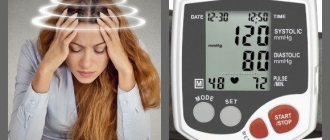Psychosomatics is a view of health and illness that recognizes the close connection between physical symptoms and mental experiences. The body manifests a disease or symptom of a hidden mental disorder. This is why the basis of psychosomatic teaching is to influence a disease or symptom by searching for the problem at the mental level. Psychosomatics can be understood both in a narrow sense, where mental functions influence a person’s physical condition, and in a broader concept, where illness arises due to the combined effects of physical, mental, social and environmental factors. The ability to solve many problems that medicine cannot cope with is psychosomatics (dizziness is no exception).
When dizziness is caused by psychosomatics
According to psychosomatic experts, up to 70% of physical problems are caused by mental disorders. Constant stress, lack of sleep, work and personal worries create a lot of stress on the body, which often leads to some kind of physical problem. The cause may also be the suppression of fear, dysfunctional relationships, dissatisfaction with one's own body, the death of a loved one... The body also remembers all the negative emotions experienced in childhood and adolescence. It gives clear signs (headaches, joint pains, muscle pains, dizziness, palpitations, diarrhea, weakness, etc.) signaling the presence of disorders. This is the right time to make changes. If these symptoms are ignored, occasional physical problems develop into chronic illness.
What does a person experience with a disease that has roots in psychosomatics? If he is constantly dizzy, manifestations of instability when walking, unsteadiness of gait force him to visit a doctor and undergo the necessary tests. But everything turns out to be okay. Neither imaging nor laboratory tests show abnormalities. The patient is a little surprised, but at the same time calms down. Sometimes it seems impossible to him, because the symptoms are present. He suffers from dizziness and fatigue. He comes to the doctor again because the unpleasant signs are becoming more and more worrying. If the clinician thinks about the context of the patient's life and asks about experiences, they can jointly identify the overlap of physical difficulties and psychological distress. The patient understands that his problems may be related to what he is experiencing internally.
Psychosomatic symptoms should not be underestimated and require proper reconsideration. Only then can we say that the problem relates to psychosomatics.
Important! Even if psychosomatic problems persist for a long time, some examinations need to be repeated.
Shock and dizziness
In general, dizziness is more closely associated with shock rather than stress. When you feel overwhelmed and overwhelmed, you also begin to feel emotionally and physically out of place, and that's when dizziness sets in.
At some point, the tension can be so overwhelming, both in the mind and in the body, that a slight shock sets in and causes dizziness. This can happen in everyday life. For example, you have a deadline and you have to work like crazy. As the deadline creeps closer, you realize that you can't get the work done on time, and the thought makes you feel a little dizzy.
Psychosomatics of dizziness according to V. Zhikarentsev
According to V. Zhikarentsev’s psychosomatics, dizziness is caused by attempts to escape from real problems and feelings. A person does not see beyond his personal world.
Solution: noticing things around you, being in harmony with reality.
Body image is very important not only because of illness. Often this perception is not easy. We live far from physical feelings, we do not respect our body, we neglect it, first of all, to satisfy the expectations of others. But the body is an amazing source of energy, experience, pleasure, information. Living in harmony with the body ensures relaxation, flexibility, and self-confidence.
Important! Meditation, yoga, dancing, energy exercises (for example, tai chi, etc.) or any other activity that promotes conscious perception of the body will help improve the contact between the soul and the physical shell.
Causes of dizziness in a healthy person
A completely healthy person usually experiences attacks of dizziness in several cases:
Adrenaline rush.
For example, during air travel, public speaking, severe stress or fear. The stress hormone (approx. - adrenaline) enters the blood, after which the blood vessels narrow and there is a failure in the delivery of oxygen to the brain. In this case, we do not talk about pathologies.- Movement that is too fast and unusual for the brain (for example, riding a carousel).
- Lack of nutrition, feeling of hunger. In the absence of a normal diet and snacking on the run, only by the end of the day does a person receive those calories, glucose and other useful substances that are needed for the normal functioning of the brain and the whole body. An attack of hunger easily provokes dizziness.
- Impaired vision focusing. Most often she feels dizzy at altitude. After looking into the distance for a long time, the eye muscles relax, and when looking at nearby objects, the person feels slightly dizzy.
- Sharp turns, deep bends, intense rotational movements . Again, don’t immediately panic and look for symptoms of something terrible. For example, for adolescents such conditions are quite normal and are caused by the process of growth (including of brain vessels).
- Taking medications. In principle, such an adverse reaction to the drug is described in almost every instruction. Dizziness may begin due to personal intolerance to the medicine, due to incorrect dosage and other reasons. But most often this condition is caused by allergy medications, powerful antibiotics and strong sedatives.
- Smoking. This is also not surprising. Nicotine, entering the brain, promotes vasodilation. The same can be said about taking drugs.
- Pregnancy. Early toxicosis and dizziness are also the norm.
Psychosomatics of systemic vertigo according to L. Burbo
According to the theory of L. Bourbo, systemic dizziness arises from certain blocks created by the person himself.
Physical block
Since dizziness is an unpredictable phenomenon, it is generally accepted that it occurs purely by chance. But that's not true. Nothing happens by chance. All disorders and diseases are tools that the Universe uses to attract attention. Just take into account which part is affected and how serious the problem is. These are important considerations that help to understand the metaphysical cause of the condition.
Emotional block
Illnesses, disorders, symptoms, including dizziness, are interpreted unconsciously as punishment, because at a deeper level the person blames himself and his inner self. He feels responsible for what happens around him. Illness is a way to neutralize guilt through punishment. Unfortunately, all this happens unconsciously.
Mental block
The definition of guilt needs to be reconsidered. Under the legal system, a person is found guilty when it is proven that the harm caused was intended. Every time you blame yourself, feel guilty, realize whether you intended to cause harm. If not, stop mentally blaming yourself.
Important! Treatment of psychosomatic disorders usually takes a relatively long time. Especially when it comes to long-term, chronic problems. If difficulties occur for a short time, there is a high probability of rapid healing.
The main causes of the disease
According to scientists who have studied the psychosomatics of dizziness, it is more common in people prone to panic attacks. Mostly psychogenic vertigo occurs against a background of stress, and there are many factors that can provoke it. This can be a constant state of anxiety for yourself or your loved ones, chronic fatigue and even lack of sleep.
Climax
Menopause occurs in women around 50 years of age and is accompanied by hormonal disorders and loss of reproductive function.
One of the main problems that a woman faces during menopause is a violation of psychological balance. She is disturbed by suspiciousness, irritability, and becomes vulnerable. Vertigo may appear against a background of constant anxiety.
During this period, the support of loved ones and a friendly atmosphere are important to the lady. This helps get rid of unpleasant symptoms.
Stress and depression
Stress is one of the main causes of psychogenic dizziness. When a person is on edge, the lungs hyperventilate, which in turn causes the arteries to narrow, causing less blood to reach the brain and other parts of the body. The result is that a person becomes dizzy and his fingers and toes go numb.
To relieve dizziness after stress, you need to sit down, calm down, breathe deeply, or go for a walk in the fresh air.
Lack of sleep
Lack of sleep can cause persistent headaches and dizziness. If lack of sleep is constant, the pain can turn into a migraine.
Usually the pain is concentrated in the neck area, sometimes affecting the upper back. Getting rid of the disease is simple. All you need to do is get a good night's sleep.
Osteochondrosis of the cervical spine
Osteochnodrosis is a common disease of people employed in sedentary professions. When it occurs, abrasion of the vertebrae occurs, even to the point of disc rupture. In advanced stages, the pathological process is accompanied by dehydration, lack of vitamin C, and infectious processes.
The first symptom that occurs with osteochondrosis is dizziness. Patients also feel:
- nausea and vomiting;
- blood pressure problems;
- visual impairment;
- noise, ringing in the ears;
- instability, unsteadiness of gait, loss of coordination.
With sudden movements of the head, vertigo intensifies, and headaches with osteochondrosis cannot be treated with analgesics, as they are caused by traumatic processes in the vertebrae. Typically, patients with osteochondrosis are prescribed Mexidol.
Meniere's disease
Meniere's disease is a disease of the inner ear that causes sudden attacks of dizziness when everything around you seems to be spinning. Hearing loss or tinnitus are common. Attacks of vertigo may be accompanied by vomiting, sweating, and weakness. They last for several hours, after which improvement occurs. As deafness increases, attacks occur less frequently.
High blood pressure
Vertigo is a common and common symptom of hypertension. During crises, a person can only lie in bed with his eyes closed. When you open your eyes, the headache and dizziness intensify, and the urge to vomit appears.
Sometimes increased blood pressure is accompanied by increased heart rate and nosebleeds.
Due to frequent illnesses, the character deteriorates. The person becomes angry, irritable, tough.
Previous stroke
A stroke does not go away without leaving a trace and is accompanied by disruption of many body systems. Thus, the blood supply suffers, atrophy of brain tissue is observed, and some functions are lost.
One of the complications after a stroke is frequent dizziness, which is accompanied by headache. A course of restorative therapy and lifestyle changes help relieve discomfort.
Pinched artery in the neck
Pinched cervical artery or vertebral artery syndrome occurs due to disruption of blood flow in the vertebral arteries. This condition is accompanied by vertigo. Occurs for the following reasons:
- abnormalities in the structure of the artery, its pathological tortuosity;
- diseases that reduce the lumen of blood vessels (arteritis, atherosclerosis, embolism and thrombosis;
- external compression of the artery due to cervical osteochondrosis, trauma, scoliosis, due to tumors or muscle spasms.
Psychosomatics of dizziness according to V. Sinelnikov
According to V. Sinelnikov, the causes of dizziness are in accumulated problems, the inability to solve them, caused by “flying thoughts,” i.e., the inability to concentrate.
Solution: Discipline, focusing on a specific problem until it is solved. Determining your life goal.
When physical problems arise, a person’s greatest desire is to get rid of them. However, when looking at difficulties from a broader perspective, new space opens up. It’s not just about getting rid of a symptom, but also about understanding it, finding out why it appears, what it means. The body is perceived as a guide. And illness often arises in a situation when you need to stop, rethink the current situation, change it or your views on it, and move on. The healing journey can be an adventurous path of self-discovery and self-development. Illness can lead to perceptions of the body, mind and soul, context and meaning as a whole.
Prevention of psychogenic dizziness
In order to reduce the amount of dizziness, you must not only try to remain calm in all situations and learn to control yourself, but also follow some recommendations:
- Move more and do exercises, especially when working sedentarily.
- Observe the work and rest schedule.
- Don't overwork, get enough sleep.
- Avoid stressful situations.
- To refuse from bad habits.
- Do not make sudden movements of the head and neck, and do not suddenly change the position of the body.
- Relax more in the fresh air.
- Limit the consumption of salt, strong tea and coffee.
- Learn relaxation techniques.
If you experience frequent attacks of dizziness, you should consult a doctor. If serious pathologies are detected in the early stages, therapy will be more effective. Much more often, dizziness is associated with overwork and improper work and rest schedule, but it is still better to play it safe and visit a specialist.
If you experience attacks of dizziness with characteristic mental and somatic symptoms, you need to pay attention to the state of your nervous system:
- sleep at least 8 hours a day;
- engage in physical health (walking, climbing stairs);
- take a vacation or change your environment.
If these methods do not help, you need to consult a doctor.
Did you know
- Astronauts suffer the most from dizziness. During weightlessness, blood is pumped through arteries and veins differently than on Earth - it does not accumulate in the lower parts of the body, so the smooth muscles of the veins do not need to contract and “squeeze” blood into the upper parts of the body. Due to their atrophy, up to 83% of astronauts experience a feeling of dizziness after landing, due to the fact that there is not enough blood flowing to the brain.
In order not to think about how to get rid of psychogenic dizziness, you can use effective measures to prevent the painful condition:
- Minimizing the number of stressful situations and psycho-emotional stress.
- Daily walks lasting at least forty minutes.
- Good ventilation of home and workplace.
- Adequate rest and good sleep.
- Balanced diet.
- Sufficient drinking regime.
- Refusal to use alcohol and tobacco products.
Diagnosis of the disease
Before starting treatment for psychogenic dizziness, you need to undergo a diagnosis. The patient is recommended to consult the following specialists:
- therapist;
- otolaryngologist;
- cardiologist;
- neurologist;
- psychiatrist.
To determine the causes and nature of vertigo, the following types of examinations are prescribed:
- Ultrasound examination (ultrasound) of large vessels and arteries that supply blood to the brain;
- computed tomography (CT) of the brain. Allows you to identify disorders in the structure of the brain;
- radiography of the skull and cervical spine;
- blood tests: general and biochemical;
- determination of blood sugar levels;
- balance tests;
- audiography;
- definition of nystagmus.
At the initial stage of diagnosis, the doctor must exclude all causes that may be associated with loss of balance. These include:
- problems with vestibulation;
- diseases, the symptoms of which are dizziness and fainting.
The examinations described above help to detect and distinguish between these diseases.
At the second stage, neurotic disorders that arise against the background of stress and depression are diagnosed. The most common causes of a psychogenic nature are anxiety-depressive disorders and panic attacks.








